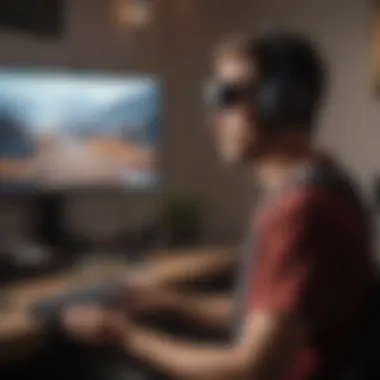Exploring Video Games as a Therapeutic Tool for Anxiety Management


Intro
In recent years, the conversation surrounding mental health has expanded to include various unconventional methods for treatment. Among these, the use of video games has garnered increasing attention. Many individuals, particularly those seeking alternative approaches to managing anxiety, find solace in the interactive nature of gaming. This article delves into the complexities of video games as potential therapeutic tools. It aims to clarify how specific game mechanics and player engagement strategies can be harnessed to alleviate anxiety symptoms.
Benefits of Video Gaming for Anxiety Management
Therapeutic Escape
Video games offer a unique escape from the pressures of daily life. By immersing oneself in a virtual world, players can distance themselves from stressful situations. This distraction can lead to reduced feelings of anxiety.
Skill Development
Games often require players to engage in problem-solving and strategic thinking. These skills are not only essential for progressing in the game but can also transfer to real-life situations. Players may find themselves better equipped to handle stressful scenarios through enhanced coping skills honed during gameplay.
"Video games can help bridge gaps in emotional understanding by allowing users to step into different roles and perspectives."
Social Interaction
The multiplayer aspects of many games allow for social connection. Building camaraderie with other players can combat feelings of isolation. Such interaction can provide a support network that helps in mitigating anxiety.
Techniques and Practices in Video Gaming
Overview of Game Design Elements
Understanding game mechanics is crucial in evaluating how they impact anxiety management. Elements like reward systems, narrative engagement, and player choice contribute to a sense of agency. Games designed with these principles can create an environment conducive to relaxation and engagement.
Types of Therapeutic Games
- Puzzle Games: Engage the mind and require focus, diverting attention from anxiety.
- Simulation Games: Provide control over environments, allowing for safe experimentation in various settings.
- Role-Playing Games (RPGs): Enable players to embody different characters, exploring emotional depths safely.
Through this analysis, it becomes clear that certain genres can serve specific therapeutic purposes. This enables players to choose games that resonate with their individual needs.
Ending
Video games possess the potential to significantly contribute to anxiety management strategies. By recognizing the key benefits and understanding the techniques that enhance player engagement, it becomes possible to leverage gaming as a therapeutic tool. As the field of mental health continues to evolve, integrating these insights may lead to more comprehensive treatment approaches.
Prolusion
In recent years, the discussion around mental health has taken on new dimensions, particularly regarding innovative solutions for anxiety management. The intersection of technology and psychological well-being is evident in how video games have emerged as a therapeutic tool. This article scrutinizes the implications of using video games for alleviating anxiety, providing a nuanced understanding of their benefits, mechanisms, and potential risks.
The importance of this topic rests in its growing relevance. With increasing anxiety levels reported globally, exploring alternative management strategies is crucial. Video games, once dismissed by some as mere entertainment, are now recognized for their capacity to engage players cognitively and emotionally. They offer unique avenues for distraction, relaxation, and even emotional regulation.
Understanding Anxiety
Anxiety is a complex emotional response often characterized by feelings of tension, worry, and physical changes such as increased heart rate. It encompasses several disorders, including generalized anxiety disorder, social anxiety disorder, and panic disorder, each presenting unique challenges. Understanding these distinctions is vital, as it shapes how interventions can be tailored to meet individual needs.
Psychologically, anxiety can manifest in numerous ways, impacting daily functioning and overall quality of life. The physiological responses associated with anxiety are not just inconveniences; they are disruptive and can create a vicious cycle of fear and avoidance. This context underscores the need for effective, accessible treatments.
The Rise of Video Games


The video game industry has witnessed exponential growth in recent decades, evolving from simple pixelated classics to sophisticated immersive experiences. Platforms such as PlayStation, Xbox, and Nintendo Switch, along with mobile gaming apps, have diversified access and engagement.
This rise is not merely demographic but also cultural, as gaming has become a significant aspect of social life. Multiplayer platforms, like those offered by Fortnite and Call of Duty, foster interaction and community, which can serve as essential elements in anxiety relief. The social dimension of gaming is especially important since companionship can buffer against feelings of isolation associated with anxiety.
Moreover, studies indicate a shift in perception regarding gaming—from a potentially isolating obsession to a potentially therapeutic environment. This transformation encourages research into how gaming mechanics can be designed to offer comfort and relief, creating a new dialogue between psychology and digital entertainment.
The Psychological Benefits of Gaming
The topic of psychological benefits of gaming holds significant relevance in understanding how video games can serve as a therapeutic tool in anxiety management. This section delves into various aspects that contribute to the positive effects that gaming can have on mental health. Video games often provide immersive experiences that can distract players from their daily stressors, allowing them to engage in a unique form of escapism. They also encourage the development of skills that are beneficial not just within the game world but in real-life situations as well.
Additionally, many games incorporate elements that naturally promote relaxation and enjoyment. This engagement can lead to improved mood and a decrease in anxiety symptoms. Understanding these benefits allows us to appreciate the multifaceted relationship between gameplay and mental well-being. Let's explore these psychological benefits in more detail.
Cognitive Engagement and Flow State
Cognitive engagement refers to the mental effort that a player invests in a game. When individuals are fully immersed in a video game, they often reach a state called flow. This flow state is characterized by complete focus and a sense of timelessness. During this period, players are so engrossed in their gaming experience that they become less aware of distractions and stressors. The concept of flow was introduced by psychologist Mihaly Csikszentmihalyi, who highlighted how it can contribute to personal fulfillment.
Achieving flow while gaming can be calming, helping players silence racing thoughts and anxious feelings. This state can foster a sense of accomplishment, particularly when players complete challenges or progress in the game. In this way, gaming not only distracts but also contributes to a positive mindset, which is critical for those managing anxiety.
Social Interaction through Multiplayer Platforms
Social interaction is another critical psychological benefit of gaming. Multiplayer games, such as World of Warcraft or Fortnite, create opportunities for players to connect with others. These platforms enable shared experiences, fostering interactions that can enhance social skills and provide a sense of community. For individuals dealing with anxiety, this connectivity can be invaluable. Many players find that engaging with others in a game allows them to build friendships and share experiences without the intense pressure of face-to-face interactions.
Moreover, the teamwork often involved in multiplayer games can lead to a feeling of belonging. Players can cooperate to achieve common goals, reinforcing social bonds. This social aspect mitigates feelings of isolation, which can be a symptom of anxiety disorders. The community found in multiplayer environments can serve as a support system, offering comfort and understanding through shared experiences.
Emotional Resilience Development
Emotional resilience is essential for managing anxiety effectively. Video games can play a role in nurturing this trait by presenting challenges that require players to adapt and overcome obstacles. This gameplay dynamics can mirror real-life situations, allowing players to experiment with problem-solving and coping strategies in a low-stakes setting.
For instance, in games like The Last of Us or Celeste, characters face various trials that demand emotional strength and persistence. Players who navigate through these storylines tend to reflect on their own challenges. By engaging with these narratives, players can develop greater empathy and resilience, which are crucial when facing anxiety-inducing situations in real life.
Building this resilience through gaming experiences reinforces the idea that difficulties can be surmountable. This mentality translates beyond the gaming environment and can empower individuals in their everyday lives. It is a testament to how gaming can foster both personal growth and coping mechanisms for anxiety management.
Specific Genres Effective for Anxiety Relief
The exploration of specific video game genres is crucial in understanding their potential as therapeutic tools for anxiety management. Each genre offers unique experiences that can resonate differently with players. This diversity allows individuals to select games that align with their personal preferences and specific anxiety needs. By recognizing the distinctive attributes of various genres, we can appreciate their contributions to alleviating anxiety.
Role-Playing Games (RPGs)
Role-Playing Games are designed to immerse players in rich narratives and complex characters. One of the key benefits of RPGs is the opportunity for escapism. Players can step into a character's shoes and navigate a fictional world, serving as a distraction from their own anxieties. This immersion in a fantastical universe can provide a temporary relief from real-life stressors.
Furthermore, RPGs often require strategic thinking, problem-solving, and decision-making, which can distract the mind from anxious thoughts. Engaging in quests and challenges allows players to focus on the game's mechanics rather than their anxiety. Recent studies indicate that players who engage in RPGs report a decrease in anxiety symptoms and a heightened sense of accomplishment as they progress.
Simulation Games
Simulation games offer a unique platform for players to engage in real-world activities in a controlled environment. Games like The Sims enable individuals to create and manage their own virtual lives, allowing them to exert control over their experiences. This sense of control can be particularly beneficial for those experiencing anxiety, as it fosters a feeling of agency in their decision-making process.
Moreover, these games often provide an opportunity for relaxation. Players can design spaces, build structures, and curate environments at their own pace. The absence of a high-pressure scenario allows for exploration without the fear of failure. This can encourage mindfulness, helping players to stay present and reduce anxious feelings.
Puzzle Games
Puzzle games engage the cognitive faculties and can divert attention from anxiety-inducing stimuli. Games like Tetris or Candy Crush challenge players to solve problems under time constraints. This mental engagement fosters concentration and can lead to a state of flow, where players lose track of time and become absorbed in the task.


Additionally, puzzle games provide immediate feedback. Solving a puzzle increases dopamine levels, creating a sense of pleasure and achievement. This combination of mental stimulation and positive reinforcement has been shown to promote emotional stability and lower anxiety levels.
In synthesis, these genres—RPGs, simulation, and puzzle—demonstrate how gaming can serve as a beneficial tool for anxiety relief. Selecting games that resonate with one's interests can enhance the therapeutic experience. Through thoughtful exploration of these genres, individuals can discover specific games that not only entertain but also support their mental health journey.
Game Mechanics that Alleviate Anxiety
Game mechanics play a crucial role in how video games can serve as a therapeutic tool for anxiety management. They are the specific elements and systems within games that can engage players while also offering psychological comfort. Understanding these mechanics can provide insight into their potential benefits and how they can be effectively utilized to help individuals cope with anxiety.
One of the main advantages of these mechanics is their ability to create a structured environment. Players can engage with content at their own pace, enabling a sense of control that is often lacking in real life for those dealing with anxiety. The immersive nature of games combined with thoughtfully designed mechanics can provide a comforting escape, allowing individuals to step away from their stressors.
Gradual Difficulty Progression
Gradual difficulty progression is an essential design principle in many games. This mechanic allows players to experience challenges that increase in complexity over time. For someone with anxiety, this can serve as a gentle introduction to stress management. Facing achievable challenges without overwhelming pressure fosters a growth mindset, encouraging players to develop problem-solving skills. As they advance through levels, players often feel a sense of accomplishment, which can enhance self-esteem and reduce anxiety levels.
The principle of gradual progression aligns closely with therapeutic practices. By experiencing manageable challenges, players can gradually acclimate to higher levels of stress. This method mirrors exposure therapy, a common approach in cognitive-behavioral therapy, where individuals are exposed to anxiety-provoking situations in a controlled manner.
Rewards and Positive Feedback Loops
Rewards and positive feedback loops are key components that motivate players and encourage continued engagement. Many games incorporate systems of rewards that recognize player achievements, ranging from simple acknowledgments to tangible in-game benefits. These rewards can activate the brain's pleasure centers, leading to increased dopamine production. This positive reinforcement can be particularly beneficial for individuals with anxiety, as it fosters a sense of accomplishment and encourages them to persist in facing challenges.
The immediate feedback provided through game mechanics can also create a sense of progress and success, which is often absent in real-life situations for those experiencing anxiety. This instant gratification can help counter feelings of unworthiness or inadequacy, allowing players to build emotional resilience over time.
Safe Spaces within Games
Safe spaces within games are environments where players can explore without threat or pressure. These spaces often allow for relaxation or social interaction without the stressors of competition. Fortnite, for instance, features a creative mode where players can build and explore in a non-competitive setting. Here, individuals can interact and develop social connections at their own pace, reducing feelings of isolation.
Feeling safe and free from judgment can be instrumental for someone managing anxiety. Safe spaces allow players to experiment with their identity and express themselves without fear. They can take risks in a controlled environment, leading to personal growth and improved coping strategies. This aspect of gaming creates a sanctuary where players can recharge emotionally, helping to mitigate anxiety symptoms effectively.
"The mechanics of video games can serve a purpose beyond entertainment; they can present strategies for personal growth and emotional well-being."
Case Studies and Research Findings
The exploration of video games as a therapeutic tool for anxiety management gains credibility through extensive case studies and research findings. This section illuminates the empirical evidence supporting the connection between gaming and mental health benefits. Examining documented results offers invaluable insights into how different individuals respond to gaming interventions. It also helps identify which aspects of games foster anxiety relief, based on varying demographics and psychological backgrounds.
Quantitative Research Analysis
Quantitative research offers a robust framework for assessing the therapeutic potential of video games. This approach often involves controlled experiments and surveys that collect numerical data about players' experiences. Significant findings frequently highlight reductions in anxiety symptoms among participants. For instance, research may track pre-and post-gaming anxiety levels through validated psychological scales.
- Empirical Evidence: Many studies report statistically significant reductions in anxiety for players engaging with specific genres like role-playing games and simulation games.
- Longitudinal Studies: These follow participants over time, providing insights on the sustained impact of gaming on anxiety management.
- Comparative Studies: Some research compares gaming interventions with traditional therapeutic methods, often revealing complementary benefits.
The data collected helps professionals understand the extent to which video games can serve as a constructive tool within a broader mental health strategy. By quantifying the impact, clinicians can better advocate for integrating gaming into therapeutic practices.
Qualitative Insights from Players
Qualitative research allows a deeper understanding of personal experiences and subjective benefits derived from gaming. Narratives from players often reveal how games serve not just as distractions but as means for skill reinforcement in coping with anxiety. Insights gathered from interviews and focus groups provide rich context on the player's lived experiences.
- Personal Narratives: Many players report using gaming as an escape, allowing them to step away from their real-life anxieties momentarily.
- Community and Support: Engaging in multiplayer experiences fosters social connections, which can alleviate feelings of isolation that often accompany anxiety.
- Coping Strategies: Players frequently share anecdotes about specific in-game experiences that have helped them in real-life situations, enhancing their emotional resilience.
These qualitative insights serve to humanize the statistics, showcasing the personal transformations that can occur through the medium of gaming. They also help in identifying which game elements resonate most effectively with players, providing guidance for future game development aimed at mental health support.


Challenges and Limitations
The discussion of video games as a therapeutic tool for managing anxiety is incomplete without acknowledging the challenges and limitations associated with this approach. While there are many potential benefits, it is crucial to address the negative aspects that can arise from excessive or inappropriate gaming. This analysis delves into two main concerns: the potential for addiction and the negative influences of gaming on mental health.
Potential for Addiction
One of the most significant risks associated with video gaming is the potential for addiction. Gaming can create an immersive experience that draws individuals in, making it difficult to disengage. For those who may be vulnerable to addictive behaviors, this can become a significant problem.
Addiction is characterized by an overwhelming urge to play, often at the expense of daily responsibilities and relationships. Individuals may find themselves playing for hours, neglecting sleep, work, and social interactions. This can exacerbate anxiety symptoms, creating a cycle of dependency. Symptoms of gaming addiction include:
- Preoccupation with gaming: Constantly thinking about games, even when not playing.
- Withdrawal symptoms: Feeling irritable or anxious when not gaming.
- Loss of control: Difficulty reducing playtime despite the wish to do so.
It is essential for gamers, especially those using games as therapy, to monitor their engagement. Recognizing when gaming is becoming excessive is key to ensuring it remains a beneficial tool rather than a destructive habit.
Negative Influences of Gaming
In addition to the risk of addiction, video games can also impose negative influences on mental health. It is essential to differentiate between games that promote well-being and those that might contribute to heightened anxiety or stress.
Certain genres or types of games can involve intense competitive environments, violence, or themes that may evoke anxiety rather than alleviate it. For some individuals, particularly those predisposed to anxiety disorders, engaging with such content can lead to:
- Increased Stress: Fast-paced games or those with high stakes can cause significant pressure, resulting in elevated stress levels.
- Desensitization: Exposure to violent or disturbing content can lead to desensitization, where individuals become less sensitive to real-life issues or distress.
- Social Isolation: Relying on gaming for social interaction can lead to social withdrawal and less face-to-face communication, which is essential for emotional health.
"Not all games are designed with mental health in mind. Careful selection is necessary to ensure a positive impact."
Practical Tips for Incorporating Games
Incorporating video games into one’s routine for managing anxiety requires thoughtful planning and consideration. It is not merely about playing for entertainment, but about understanding how specific games and gaming habits can contribute positively to mental health. This section will delve into selecting the appropriate games and establishing healthy gaming habits, serving as guidelines for those interested in using gaming as a therapeutic tool.
Selecting Appropriate Games
Choosing the right game is a critical step in utilizing video games for anxiety management. The genre, design, and gameplay mechanics of a game can deeply influence the player’s experience. Here are some aspects to consider:
- Genre Suitability: Games that provide calming environments or engaging narratives can be beneficial. Simulation games, such as Stardew Valley, create tranquil settings that promote relaxation. Meanwhile, RPGs like Final Fantasy offer immersive experiences that can serve as a temporary escape from stressors in real life.
- Gameplay Mechanics: Games that have clear objectives and incremental goals can support a sense of achievement. This can encourage players to focus on manageable tasks that build confidence.
- Replayability: Games with high replay value can allow users to revisit soothing experiences or continue developing skills, which can be comforting during periods of heightened anxiety.
- Community and Social Features: Multiplayer games, such as Animal Crossing: New Horizons, can create a sense of belonging and connection, important factors for emotional well-being.
"Choosing the right video game is crucial in order to create a positive impact on mental health."
Establishing Healthy Gaming Habits
While video games can provide therapeutic benefits, establishing healthy gaming habits is essential for maximizing these advantages while minimizing potential risks. Here’s how to achieve that:
- Set Time Limits: It is vital to allocate specific times for gaming. Limiting gameplay can prevent potential addiction and ensure gaming remains a positive activity rather than an escape from reality.
- Mindful Engagement: Approach gaming with mindfulness. This means being aware of your emotional state before, during, and after gameplay. If a session feels overwhelming or leads to increased anxiety, it may be necessary to take a break or choose a different game.
- Balance with Other Activities: Combine gaming with other stress-relief activities like physical exercise, reading, or meditation. This helps prevent gaming from becoming an isolated form of coping, promoting a well-rounded approach to mental health.
- Create a Comfortable Environment: The gaming setup should encourage relaxation. This includes adequate lighting, comfortable seating, and eliminating distractions. A well-prepared environment can enhance the positive aspects of gaming.
In summary, thoughtful selection of games and establishing healthy gaming habits can significantly contribute to managing anxiety. By being deliberate about these elements, individuals can leverage the therapeutic potential of video games while ensuring a balanced approach to their mental health.
Ending
In this article, we have explored the role of video games as a therapeutic tool for managing anxiety. This topic is significant due to the rising prevalence of anxiety disorders in various age groups. It highlights how video games are not merely sources of entertainment but can serve as an essential aspect of mental health strategies.
Summarizing the Value of Gaming
Video games can lead to cognitive engagement, emotional regulation, and even social connections. They can provide a much-needed distraction, and help players disengage from anxiety-inducing thoughts. The mechanism of gameplay often encourages players to enter a state of flow, where they are fully immersed in the activity. This immersion can mimic mindfulness practices that have been shown to alleviate anxiety symptoms. Moreover, the rewards and successes experienced in games can foster a sense of accomplishment and self-efficacy, further empowering individuals coping with anxiety.
"The experience of achieving goals, even in a virtual environment, can significantly enhance self-esteem and alleviate feelings of helplessness."
Future Directions in Research
Research in this area is still evolving. Future studies should focus on longitudinal analyses of gaming's impact on anxiety to draw more robust conclusions. More targeted research may explore specific genres of games or mechanics that are particularly effective. Additionally, understanding the potential adverse effects and the fine balance between gaming and addiction remains crucial. Collaborative efforts between mental health professionals and game developers could pave the way for designing games specifically aimed at anxiety management. This perspective could lead to innovations that directly address mental health needs in interactive ways.







